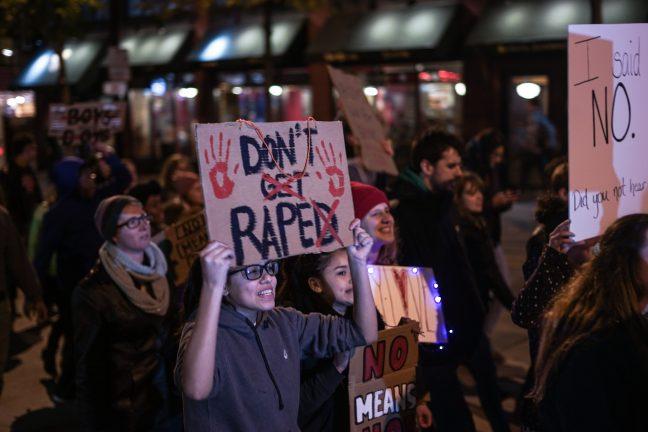CONTENT WARNING: Discussion of rape and sexual assault. If you have been sexually assaulted, or are not sure, there are several ways to get support. View options on campus through University Health Services.
Reported incidents of on-campus rape at the University of Wisconsin more than doubled in 2021 compared to the previous year, according to the 2022 UWPD Annual Security & Fire Safety Report.
The report, released Friday, Sept. 30, showed 19 reported on-campus rapes in 2021, with 18 in student housing. Comparatively, UWPD reported nine on-campus rapes in 2020.
These numbers are likely vast underestimates of cases of rape on campus. According to the Rape, Abuse & Incest National Network, only 20% of female college-age students report sexual assaults to the police.
Promoting Awareness Victim Empowerment, a student organization on campus whose mission is to reduce interpersonal and power-based violence through education and advocacy, said in an email statement to The Badger Herald that these numbers do not represent the full scope of instances of interpersonal violence that occur at UW.
PAVE said it should be noted that these reports only include those made to UWPD. Additional data from other local confidential reporting sites such as University Health Services and the Rape Crisis Center are not represented in this document.
According to an email statement to The Badger Herald from UHS Survivor Services Director Molly Caradonna, self-reported rates of victimization through population-level anonymous surveying like the AAU Campus Climate Survey remain largely unchanged, while formal reports of sexual violence have increased.
“Rather than thinking about these formal reports as suggesting increasing rates of sexual violence, this increase could mean improved campus communication about how to make a report, increased awareness of and comfort with reporting, or even increased trust in institutions to take action,” Caradonna said.
No matter what, all experiences of sexual violence are inexcusable, Caradonna said.
Significant to these statistics is that almost all rapes on campus occurred within student housing. This includes a fourth-degree assault in January and a second-degree assault in April, both in the Southeast Residence Halls.
The majority of students in residence halls are freshmen, an age group that is especially exposed to sexual violence. A study by the Journal of American College Health found that many female students experience a “red zone” — a period of time early in a female student’s freshman year of college in which she may be at a higher risk of unwanted sexual experiences.
According to Caradonna, sexual violence and rape culture occur within systems of oppression and are never the fault of the victim.
“It is our shared responsibility, each and every one of us, to create and maintain a safe campus community based on consent, respect and care for one another,” Caradonna said.
At UW, UHS Survivor Services has provided student survivors of sexual assault, sexual harassment, sexual exploitation and/or stalking with free, confidential assistance for over a decade. According to the UHS Survivor Services website, the staff provides emotional support, counseling, assistance with requests for certain accommodations, information about reporting options and tailored guidance to guide each survivor through the process.
Currently, there are six full-time mental health professionals, two full-time advocates and medical services provided by the UHS Gynecology and Sexual Health team — which includes mobile forensic nurse exams.
Recently, the advocacy program has expanded, partially due to a grant that funds one advocacy position on campus for two years and the initial pilot of the forensic nurse program. But the advocacy program, directly overseen by Caradonna, is otherwise funded by student segregated fees and run by UHS.
RAINN found that 26.4% of female and 6.8% of male undergraduates experience rape or sexual assault through physical force, violence or incapacitation. According to Caradonna, it is important to recognize that reading or hearing about these events on campus can be very activating for survivors.
“If you’re reading this story and thinking (or even wondering) about something you’ve experienced, please know that support is available,” Caradonna said. “Please reach out to UHS Survivor Services, where advocacy, mental health and medical services are available, confidentially and at no cost to students.”
The 2022 report also found 39 instances of stalking on campus, three instances of fondling, eight instances of domestic violence and five instances of dating violence. The report also included statistics on arrests, disciplinary referrals, criminal offenses, hate crimes, unfounded crimes and Violence Against Women Act violations.
Resources regarding sexual assault:
- UHS Survivor Services: [email protected], 608-265-5600 ext 3
- www.uhs.wisc.edu/survivor/ Self-schedule using the Starfish app
- Rape Crisis Center: (608)-251-7273
- Let’s Talk: uhs.wisc.edu/wellness/lets-talk
- “Sex, Sexuality and Healthy Relationships” section
- Room to be Safe: For Queer survivors of violence: (414) 856-LGBT (5428)
- National Sexual Assault Hotline: 1-800-656-HOPE (4673)
- National Domestic Violence Hotline: 1-800-799-SAFE (7233) or 1-800-787-3224








